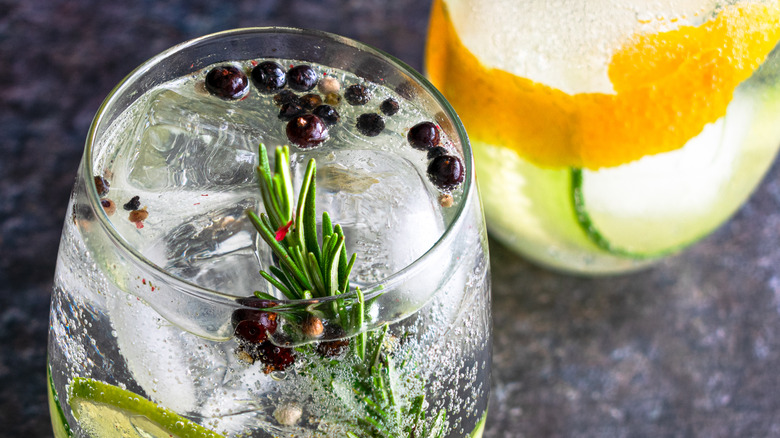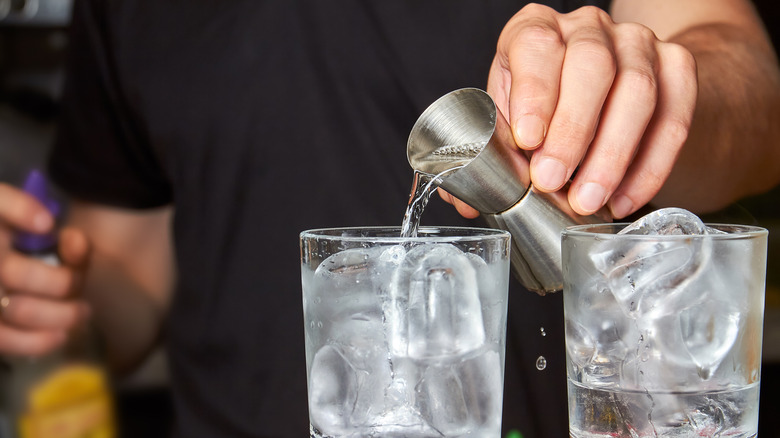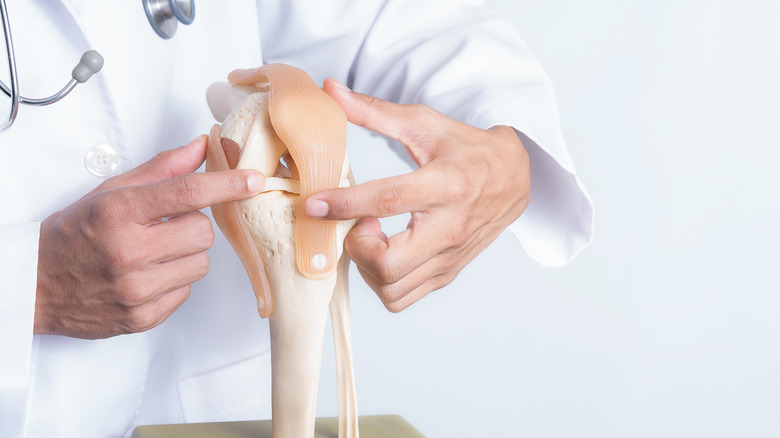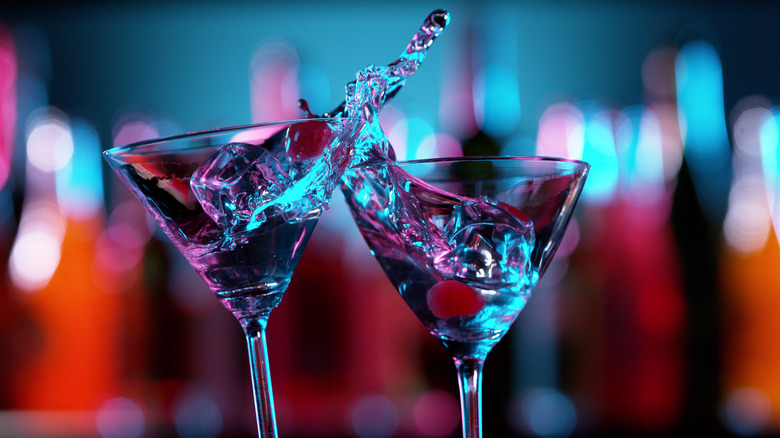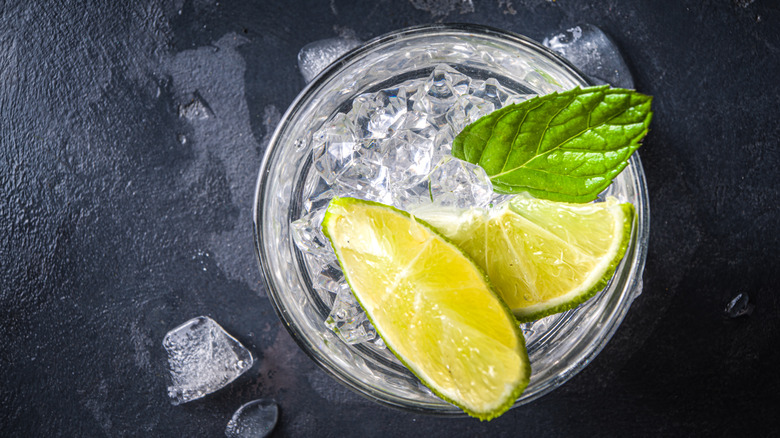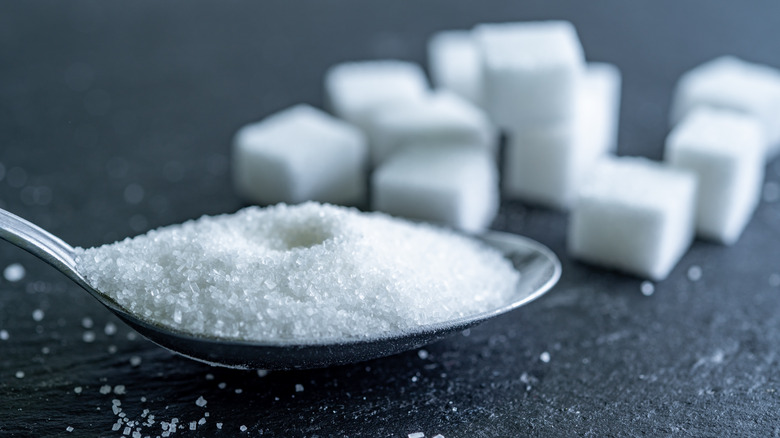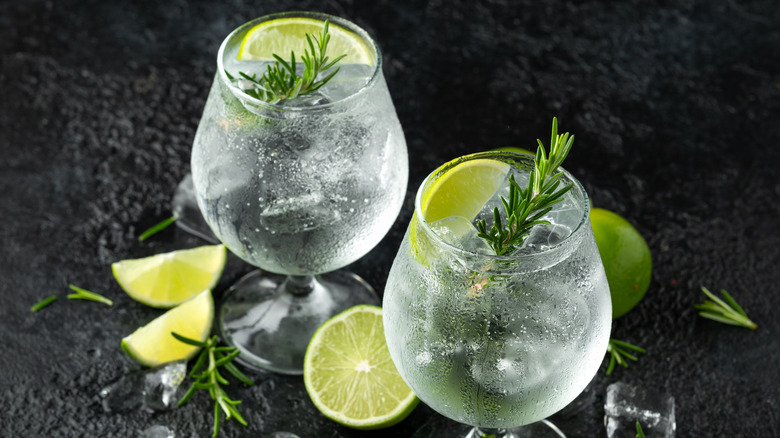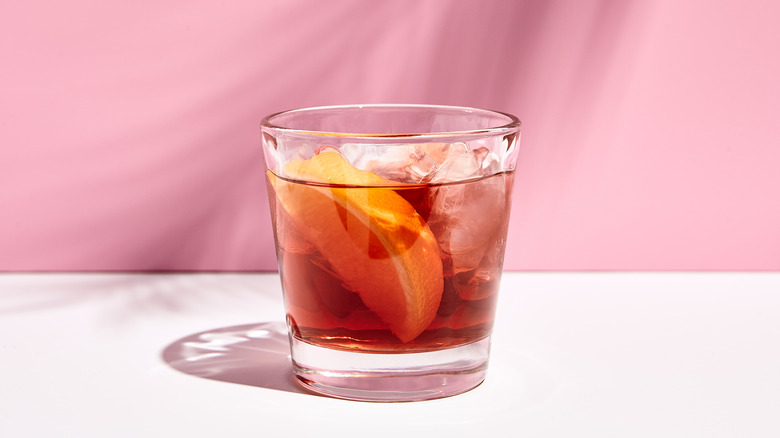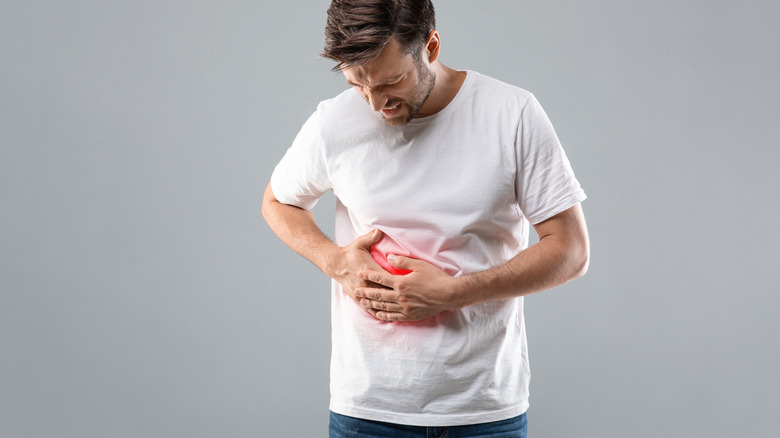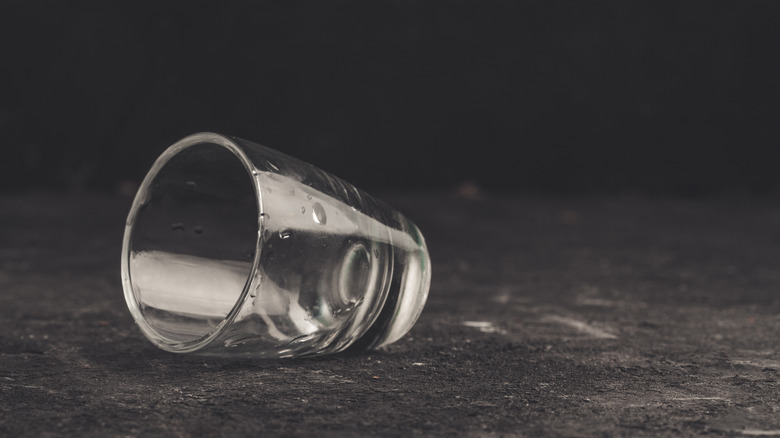What Happens To Your Body When You Drink Gin Every Night
Hey, it's five o'clock somewhere, right? When happy hour rolls around, millions of people across the globe like to usher in the evening with gin. The classic juniper-based liquor, with roots dating back to the Middle Ages (per The Manual), is a staple in cocktail cabinets and recipes alike, with options going way beyond a simple gin and tonic. Whether you're opting for a gimlet, a negroni, or a martini, you're gonna need gin to hand, says The Spruce Eats.
But as the gin market continues to grow unstoppably in size (with an almost 6% year-on-year increase between 2022-2025, according to Statista), so does our awareness of what all of this lip-smacking liquor is doing to our bodies when we drink it. And if you're a nightly gin enthusiast, while you might relish the sense of relaxation and fun that a gin-based cocktail can bring, you may not relish some of the other effects that imbibing in the spirit could have on your body. Here at Health Digest, we wanted to crack open what happens when you crack open the bottle every night. Let's take a look.
Drinking gin every night could affect your immunity
While a little tipple of gin might help you feel invigorated (until once drinking more, you become more relaxed and sedated thanks to alcohol's depressant effects, as the Addiction Center discusses), it's best not to assume that it means your body's getting more fighting fit. In fact, drinking gin every night could cause your body to become less able to fight diseases.
"Alcohol has diverse adverse effects throughout the body, including on all cells of the immune system, that lead to increased risk of serious infections," states Yale Medicine addiction medicine specialist E. Jennifer Edelman to Healthline. This effect can be particularly profound when it comes to respiratory diseases, explains Southern California-based practicing family physician Alex Mroszczyk-McDonald, because of alcohol's potential to damage airway cells. When this happens, viral particles can "more easily gain access," Mroszczyk-McDonald says, "causing immune cells, which fight off infection, to not work as well." Ultimately, this can lead to more harmful, longer-lasting illnesses.
When you drink gin every night, you could decrease your risk of heart disease
There's a lot of talk about red wine's potential to help keep your heart ticking along nicely (although these links need further research to be completely understood, as the Mayo Clinic states). But did you know that gin could have some benefits for your heart as well? Most notably, gin and other alcohols could help decrease the prevalence of cardiovascular disease, with there being "some evidence to suggest that moderate consumption can help reduce the risk of heart attacks," says nutritionist Jackie Lynch to GoodtoKnow.
It's important to remember, though, that gin's positive effects on heart health are wholly dependent on the amount you drink. Lynch points out that the benefits are seen when drinking "one small glass per day, as studies have shown that as you increase your intake to three glasses per day the risk of cardiovascular disease increases dramatically." As a result, make sure you're keeping tabs on your intake, and not overdoing it with your measures. Lynch suggests opting for a single instead of a double at the bar to make sure your heart's getting all of the benefits and none of the drawbacks.
Drinking gin could affect your bone health
Our bones sure do put up with a lot, and it's only right that we repay the favor by consuming a diet that'll keep them robust and healthy. Unfortunately, though, if you're drinking gin every night, you might not be doing them the solid that they deserve.
Gin, as well as other drinks with alcohol, can have a huge impact on bone development and the risk potential for developing bone diseases, including osteoarthritis, says Creaky Joints. One of the ways that gin can impact bone health is through its effect on how the body processes essential minerals and vitamins. "Alcohol can decrease the absorption of calcium via the intestine, or it can have effects on the pancreas and vitamin D metabolism, which can impact bone density," says the director of the Emory Orthopaedics & Spine Center and professor of orthopedic surgery Scott Boden. Vitally, bone health is most profoundly compromised by long-term, heavy drinking, with research published in Alcoholism: Clinical and Experimental Research outlining the link between chronic heavy intake of alcohol and the development of osteoporosis.
Drinking gin every night could affect your digestive system
A little digestif to set you on your way? While countless people like to finish off their evening meal with an alcoholic drink on the understanding that it'll help with digestion, using gin to do so might not be as cut-and-dry as you think.
Some may swear by gin's helpfulness to aid digestion, thanks to its key ingredient of juniper berries giving it its distinctive flavor. Indeed, research published in the Journal of Dairy Science has noted the potential benefit that juniper berries have on digestion (albeit in a study focused on cows).
Alcohol's larger effects on digestion, however, may cause you to think twice about reaching for the gin bottle. "Alcohol can cause acid reflux," says Sovereign Laboratories' resident dietitian Alicia Galvin to Eat This, Not That. When you drink booze, the lower esophageal sphincter, which separates our esophagus and stomach, relaxes. "When this happens, acid from the stomach can more easily come up into the esophagus and cause occasional heartburn." Probably not the effect you want after a heavy meal, then.
Drinking gin every night can affect your mouth
Mouth health isn't as simple as just brushing our teeth twice a day, folks. Our oral health is affected by pretty much everything that passes our lips, and this includes the alcohol we drink. So if you're a gin drinker, it may be useful to know that alcohol can have a pretty negative effect on your dental and gum health if you're drinking to excess, as Michael G. Landy DDS points out. For your gums, drinking alcohol in heavier quantities can increase your likelihood of periodontitis, as well as your potential to develop gingivitis.
A larger and more regular intake of alcohol can also cause your teeth to be impacted, with a higher chance of developing cavities. This is largely down to alcohol having a dehydrative effect on your mouth. When your mouth is drier, with less saliva to help wash away bacteria, plaque can build up more effectively, eventually leading to tooth decay. This is exacerbated if your gin cocktails contain acidic components or sugary mixers, like full-sugar tonic water or fruit juices.
It could affect how effective your workouts are
Let's be real: We don't think there are many people out there who think that knocking back a few gins will make their 10-kilometer run easier the next day. But it bears keeping in mind that drinking alcohol can affect your workouts in more ways than just feeling a little more tired when you hit the track.
Notably, alcohol can have a big impact on your recovery from exercise. "Alcohol intake affects the rate by which muscles repair (when working out, muscles tear and then repair, leading to growth)," says registered dietitian Coral Dabarera Edelson to Eat This, Not That. After a workout and before your next gym session, increased protein synthesis occurs to help your muscles rebuild bigger and stronger. However, drinking alcohol (particularly immediately after working out) can inhibit this, meaning that your gains are less pronounced.
As such, if you're in the habit of working out after finishing work for the day and rewarding yourself with a gin cocktail or two, it might be worth rethinking your timings. "The longer you can space out your drink from your workout, the better," advises Edelson.
You might think it'd help with hay fever — but don't count on it
Ever wondered how to ease that congested feeling when spring and summer roll around? Beyond antihistamine medication, you might have heard on the grapevine that gin is an excellent remedy for hay fever symptoms. But before you grab yourself a bottle and toast to clear sinuses, it might help to dig a little deeper.
The claim that gin can help ease hay fever apparently stems from a story that circulated claiming that, as per a report from Asthma UK, gin and other clear spirits could reduce symptoms (via HuffPost UK). In fact, the organization was looking at the effect that different types of alcohols have on asthma, not necessarily just hay fever. Furthermore, Asthma UK refuted these claims when approached by HuffPost UK, saying that "alcohol can actually increase sensitivity to pollen, so our advice is that it may be worth avoiding it when the pollen count is high." Maybe best not to count on that cocktail to ease that blocked nose, folks.
Drinking gin could alter your microbiome
Praise be to the gut. Not only does it withstand the endless onslaught of food and drink that we send its way, but it also contains a regular universe of microbes that help keep our body in working order, the microbiome. It's as important to feed our guts with things that help boost our microbiome as it is to limit things that could affect it negatively — and if you drink gin every night, it's worth knowing that this may not be the best thing for your microbiome's health.
According to research published in Alcohol Research, alcohol consumption can provoke harmful changes in the microbiota composition in your gastrointestinal tract, particularly in individuals who drink alcohol in higher quantities. Alcohol can also cause your gut to become inflamed, ending up changing our tolerance to certain foods, The Gut Stuff says. On a more behavioral level, drinking alcohol can make us crave foods and make dietary choices that our guts don't love — namely, processed foods which, while immediately tasty when a little tipsy, can throw our microbiome out of whack.
Drinking gin can help reduce your sugar levels
We've all been subject to those overly-sugary cocktails laden with clear spirits. But on their own, those spirits are pretty simple nutritionally, and gin (as well as liquors like vodka) are sugar-free, according to WebMD. For this reason, gin can be an excellent choice as an alcoholic drink for anybody looking to reduce their sugar intake, and the liquor also can contain fewer calories than other alcoholic drinks.
For comparison's sake, the carb content of wine can vary enormously depending on the sweetness of the wine that you choose, ranging from anywhere between 1-2 grams of sugars for a glass of dry wine to 20 grams per glass for a serving of port (per Diabetes.co.uk). Beer lovers will also end up consuming more sugars than those who opt for gin or other clear liquors, with a serving of beer delivering anything between 5 to 20 grams of carbs. Just remember that with gin, the mixer that you choose could vastly alter the sugar content of your drink. Choosing a low-sugar or sugar-free mixer will help keep the carb levels down.
Drinking gin could help you live longer
Since time immemorial, gin has been championed as a health remedy for all sorts of things. This so-called "water of life" has been used since the Middle Ages as a remedy for ailments as diverse as cramps, coughs, colds, kidney stones, and gout, according to the South Ormsby Estate.
But could the "water of life" actually help you live longer? According to research published in Alcoholism: Clinical and Experimental Research, some findings seem to point that way, with findings indicating that moderate drinking may be linked to lower all-cause mortality compared to not drinking alcohol at all.
Perhaps this was why famed Julia Child, who lived to the admirable age of 91, contributed her longevity to "red meat and gin" (per the Telegraph). We might have to refute the claim about red meat, however, with its consumption linked to higher mortality across the board – and for alcohol, too. As Medical News Today points out, the true link between alcohol consumption and mortality risk remains unclear, and drinking alcohol should not be recommended based on health.
The juniper in gin could have surprising health benefits
Ever wondered what gives gin its distinctive floral aroma and taste? That, friends, is down to the juniper berries that grow on conifer and spruce varieties and flavor each sip.
The juniper present in gin may not just be good for your palette. These bitter berries may also have some pretty cool health benefits. Research published in Pharmacognosy Journal points towards the high antioxidant levels in juniper berries, as well as their ability to help inhibit bacterial growth, with potential usage in combating arthritis, gout, and rheumatism.
Meanwhile, research published in International Scholarly Research Notices also notes juniper's potential anti-inflammatory effects, in addition to antimicrobial, antifungal, and antimalarial activity. Not bad for a humble berry, right? Bear in mind, however, that the latter study states that further research needs to be undertaken to confirm juniper's ability to provide health benefits. Remember, too, that while the juniper berries in themselves may have these properties, the distillation process or use of juniper flavorings to create certain gins may make their therapeutic benefits null and void when it comes to drinking it.
Drinking gin every day could see you consuming more calories
Despite it being a clear beverage, gin is decidedly not a health drink. And if you're drinking gin daily, you can expect to see your calorie intake increase. One 45ml measure of an 80-proof gin will provide your body with 97 calories before any mixers are taken into account, as MedlinePlus states.
Furthermore, drinking alcohol can also alter our behavior when it comes to eating habits, causing us to consume more calories across the board and opt for food choices that may be less nutritious overall, says registered dietitian Coral Dabarera Edelson to Eat This, Not That. And crucially, drinking alcohol can alter the way that our body processes our calories. "The body uses alcohol as a fuel source first, leading other nutrients (fat, carbohydrates) to be stored as fat in the body," Edelson states. Bear in mind that the calories in alcohol are considered "empty calories" with very little nutritional value: As such, they won't provide the same bang for their buck that other foods could.
Drinking gin every day could affect your liver health
Consuming too much of anything will affect our bodies, and if you're drinking gin regularly, you could start to see some profound consequences to your liver health.
Excessive drinking over time can lead to the development of alcohol-related liver disease (ARLD), a condition that occurs in stages and increases in severity, as Healthline discusses. The first stage, alcoholic fatty liver disease, can be reversed by abstaining from alcohol. But if left untreated and if drinking continues, it can progress to alcoholic hepatitis, a swelling of the liver that can eventually lead to the final stage of ARLD, cirrhosis. This stage, characterized by liver scarring, is irreversible and can lead to liver failure.
Treatment for ARLD usually involves the patient stopping drinking, in order to give the liver its best chance of recovery and avoiding further damage. As ARLD symptoms frequently don't show up until the condition is in its advanced stages, it's highly important to monitor your drinking frequently to prevent any problems before it's too late. Sticking to the Dietary Guidelines for Americans' recommendations of two drinks or less per day for men or one drink per day or less for women can help you protect your liver health.
Drinking gin every day could be a sign of alcohol dependence
While it's very useful to consider what's happening to your body when you're drinking gin every day, it's also important to think about why you're doing it. And if you're finding it difficult to finish off a day without a drink, it could be a sign that you have alcohol dependence.
Alcohol dependence is defined by a feeling that drinking alcohol is a necessary and important thing in one's life, with an increasing reliance on drinking alcohol over other aspects of life or health considerations (per Drink Aware). It's worth remembering that alcohol dependence isn't just seen in people who drink huge amounts of alcohol daily: The condition exists in degrees of severity, and even if you're not drinking large quantities, you could still have a reliance on alcohol.
As alcohol dependence can contribute to a range of mental and physical health issues (as well as disrupt your day-to-day life), it's vital that you keep an eye on your habits and your relationship with drinking, and seek help if you feel you need it. Feeling a frequent urge to drink, assessing drinking as the cause of certain problems, and finding it hard to unwind without alcohol can all be signs that you're dependent.
If you or anyone you know is struggling with addiction issues, help is available. Visit the Substance Abuse and Mental Health Services Administration website or contact SAMHSA's National Helpline at 1-800-662-HELP (4357).

